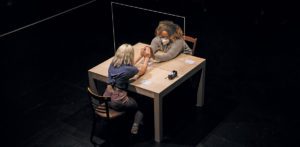I admit I was nervous. Who would I be matched with? How would it feel to be grilled by a stranger?
I showed up at the University of Michigan Museum of Art uncharacteristically early, waited in the lobby, and at the appointed time was escorted to an empty room. I sat down on one side of a small table divided by a plexiglass shield.
I had entered the set of “A Thousand Ways (Part Two): An Encounter,” a follow-up to the Ann Arbor Summer Festival’s 2021 presentation of “A Thousand Ways (Part One).” That immersive work by Abigail Browde and Michael Silverstone’s experimental theater company, 600 Highwaymen, involved a scripted telephone call to an assigned stranger. Part Two makes the interaction even more personal.
After a brief minute of worrying that no one would show up, my partner walked in. It was a man, maybe twenty years younger than me, and of a different race. Pandemic restrictions were still in force, so we both wore N95 masks.

Ann Arbor Summer Festival’s “A Thousand Ways (Part Two): An Encounter” will bring you face-to-face with a stranger. Photograph by Maria Baranova
A slot in the plastic barrier held a stack of index cards. Each had an arrow facing one or the other of us and gave instructions to take an action, like wink at the other person, or ask a question, or think a thought.
We took turns drawing. Some cards had us making collaborative shapes on the barrier with our hands, childlike activities that were both embarrassing and relaxing, and we laughed. Others asked for yes or no answers about anything from tangible to abstract abilities or feelings (“Do you know how to read music?” “Do you regret anything?”). Sometimes I felt myself trying to impress. Can I really rewire a lamp? Do I really like the way I look?
Many instructions entailed silent actions—for instance, to look at the person and imagine something about their life (“What keeps them up at night?”), or notice some detail of their face. I looked at the stranger’s face as if it were my own in a mirror, or that of someone I love.
The script acknowledged that some activities would feel awkward. My urge to rush through these battled an aspiration to slow down and be present, open, and alert. I wanted to backtrack and tell a longer story than the one-sentence answer I gave to “When was the last time you felt joy?”
That question, and others, linger in my mind days later. They’re questions I’d like to be asking myself regularly.
While the binary questions probably make the timing of the show possible, I would have liked to hear what my partner regretted. I would have liked to tell him about learning to drive a stick shift. But as a script, it’s a good one—it has an arc, or rather a spiral circling closer, and an ending—a surprising and powerful one that will encourage you to think and to feel.
Like so many things that scare me, “A Thousand Ways” proved well worth the effort. In the days since my appointment (performance?), I’ve found myself thinking of my scene partner. What’s he up to now? What did he make of it?
He’s still a stranger, but I feel like we’ve shared something real—a rare experience in these days of pandemic isolation, tech distraction, and political polarization.